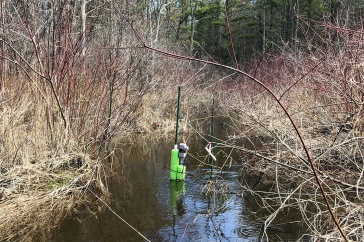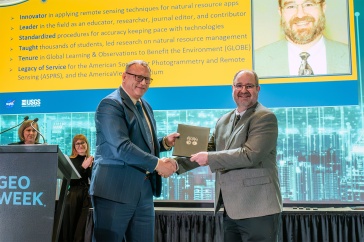
Wisconsin resident Ryan Stephens, who will graduate this summer with a doctorate in natural resources and Earth system sciences, conducted research with New Hampshire Agricultural Experiment Station scientist Dr. Rebecca Rowe. Learn about why he chose UNH for his graduate studies, what he researched, and what he's gained from his research experience.
Why did you decide to pursue a graduate degree from UNH?
The main reason I came to UNH was to work with Dr. Rebecca Rowe. In addition, I was really attracted to the interdisciplinary nature of UNH’s Natural Resources and Earth Science Systems (NRESS) PhD program. I was impressed with the resources available to students, including the benefits of travel opportunities to scientific conferences and knowledgeable faculty that are happy to interact with students. When I visited the campus for the first time, the broader Durham area and the natural beauty of New England sealed the deal.
What was the focus of your research interests and why?
My research examines resource use (diet and habitat) by small mammals and their role in forest ecosystems. I’m particularly interested in the linkages among small mammals, truffles, and trees. In New England forests, the diet of small mammals consists largely of truffles, the underground fruiting bodies of mycorrhizal fungi. Mycorrhizal fungi supply nutrients to trees which are necessary for their establishment and growth. Because these fungi rely on animals for dispersal, small mammals play a critical role in promoting forest health.
What was it like having experiment station researcher Dr. Rebecca Rowe as your mentor?
Working with Dr. Rowe has been an enjoyable experience that has allowed me to grow as a researcher. Our interests are very complementary, and I believe that we make a good team. Dr. Rowe strives for perfection and that has always challenged me to produce the best products I can. It’s a bit of an understatement, but I’ve appreciated the flexibility and freedom she’s given me to develop my dissertation, while also always helping me to maintain the big picture of where my research fits into the broader field of Ecology.
What would you tell prospective graduate students about your research experience? What do you feel you gained most from it?
I believe that keeping an open mind toward your research is extremely important. Follow your interests, as you never know where they will take you. When I first started my dissertation I had no intention of studying truffles and knew next to nothing about them. After finding them during my second year of field work, I was hooked. Four years later they have become a major focus of my research and have given me the opportunity to work with researchers from around the United States. Building these networks with other scientists has been really enjoyable and rewarding and has opened up new avenues to pursue interdisciplinary research.
What are your plans after graduation?
This fall I will start as a NH Agricultural Experiment Station postdoctoral scientist at UNH with Dr. Rowe and Dr. Serita Frey. We will be investigating the role of small mammals in forest regeneration following timber harvest, and will be monitoring both dispersal of mycorrhizal fungi and herbivory. This experimental work will be based at the Dartmouth College’s Second College Grant as part of the Adaptive Silviculture for Climate Change (ASCC) project. I’m very excited to start this interdisciplinary research project and to see where it leads me!
Founded in 1887, the NH Agricultural Experiment Station at the UNH College of Life Sciences and Agriculture is UNH’s original research center and an elemental component of New Hampshire's land-grant university heritage and mission. We steward federal and state funding, including support from the USDA National Institute of Food and Agriculture, to provide unbiased and objective research concerning diverse aspects of sustainable agriculture and foods, aquaculture, forest management, and related wildlife, natural resources and rural community topics. We maintain the Woodman and Kingman agronomy and horticultural research farms, the Macfarlane Research Greenhouses, the Fairchild Dairy Teaching and Research Center, and the Organic Dairy Research Farm. Additional properties also provide forage, forests and woodlands in direct support to research, teaching, and outreach.
-
Written By:
Lori Tyler Gula, PhD | NH Agricultural Experiment Station | lori.gula@unh.edu | 603-862-1452
















































